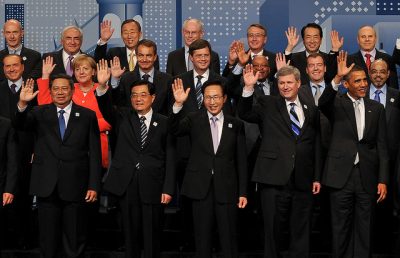Success in this, he says, requires strengthening regional institutions and architecture, and the G20 provides the platform to relate these to global initiatives.
While there are many in the region that push for de-linking regional cooperation from global cooperation, such as the Chiang Mai Initiative from the IMF, the region should not become inward looking. ‘Asia is already too prominent a part of the global system’ and Asia needs to engage and play a role in shaping and strengthening global cooperation.
Asia has assets going forward in APEC for trans-pacific cooperation and the East Asian processes of ASEAN+3 and the East Asia Summit (ASEAN+6). They are not without their weaknesses but, despite some gaps, they serve the region well and have important and complementary purposes. They are also evolving, rapidly.
One gap is that the region does not yet encompass the political and security dialogues that are a necessary anchor in managing the impact on political and security affairs of the huge changes in the structure of economic power that are taking place in the region. ‘The United States has pre-empted this issue by announcing that it wants to join the East Asia Summit’, Drysdale says, and ‘ASEAN, strategically, was in no position to resist’ such an initiative. Yet, he cautions, ‘it is by no means clear where this development will eventually lead nor that it will serve to mitigate the possibility of growing political tensions across the Pacific’.
APEC, which includes the United States and the major Asian states except India, has worked around the unique characteristics and diversity in the region to contribute to regional economic as well as political security because it is founded on strong and mutual economic interests. Drysdale warns that ‘Should EAS become primarily a dialogue for political affairs without the ballast of economic dialogues to which the United States can effectively relate, that would likely exacerbate rather than calm trans-Pacific tensions’.
On that issue there ‘needs to be much careful thinking and more dialogue on this and on the evolution of regional arrangements, beyond the Washington beltway, across the whole East Asian and Pacific region’.
A prompt we should not take lightly.
Shiro Armstrong is a Research Fellow at the Crawford School of Economics and Government at the Australian National University and Editor of the East Asia Forum.

